Pope Francis

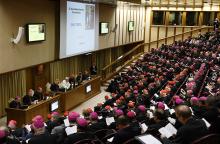
The tug-of-war at the Vatican over calls for the Catholic Church to be more open to gays and cohabiting couples intensified Oct. 16 as conservative bishops sought to rein in or renounce draft language they feared might condone lifestyles not in accord with church teachings.
The lobbying at the two-week summit of church leaders — a synod on family life that is set to wrap up Saturday with a final report — was epitomized by the retranslation of a headline from “welcoming homosexual persons” to “providing for homosexual persons.”
In the text, the line “Are we capable of welcoming these people, guaranteeing to them a fraternal space in our communities?” was changed to, “Are we capable of providing for these people, guaranteeing … them … a place of fellowship in our communities?”
The change in the English version was not made in the Italian original, where the term “accogliere,” which means “to welcome,” was kept.
The Vatican’s chief spokesman, the Rev. Federico Lombardi, said the first document was only a “transitory text” and suggested there were errors in translation.

As he wraps up a Vatican meeting marked by sharp debates over sex and morality, Pope Francis on Oct. 19 will honor one of his most controversial predecessors by beatifying Pope Paul VI, who is most famous for reaffirming the Catholic Church’s ban on artificial contraception.
Beatification puts Paul one step shy of formal sainthood. The move might seem out of step with Francis’ pastoral approach given that Paul’s birth control ruling, in the 1968 encyclical “Humanae Vitae,” set the stage for the culture wars that overtook Catholicism after Paul died in 1978.
A wide swath of Catholics, especially in the U.S. and Europe, were furious over Paul’s decision. They were convinced that the ban would be lifted and that Paul was shutting down the reforms that had begun a few years earlier with momentous changes adopted by the Second Vatican Council.
Many conservatives, on the other hand, hailed “Humanae Vitae” for reasserting traditional doctrine, and the division foreshadowed the deep splits that have played out even in this month’s high-level synod in Rome — a polarization that Francis says he wants to overcome.
Yet Francis is trying to accomplish that goal by focusing not so much on “Humanae Vitae” but on Paul VI’s many other groundbreaking, though often overlooked, contributions:
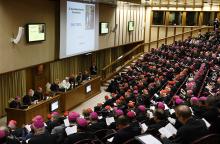
A midpoint report from this month’s Synod of Bishops reveals that Catholic leaders are considering more conciliatory language toward gays and lesbians, divorced and remarried Catholics, and couples who live together before getting married.
Meeting with nearly 200 senior prelates and several dozen lay experts and observers at the Vatican, Pope Francis has deliberately engineered a lively discussion of issues concerning marriage and family life. This assembly, and a follow-up summit in 2015, will help shape the pontiff’s legacy.
Reporters and commentators are producing a flurry of analysis mostly centered on the question of whether the synod portends a change in substance or merely a change in tone. Such is the abiding question of Francis’ papacy.
Yet through these lively debates in Catholic life runs a theme that is as old as the Reformation: the role of individual conscience.

The world’s Catholic bishops on Oct. 13 signaled a move toward greater tolerance of gays and lesbians, an about-face so unexpected that leaders of the church’s right wing called it a “betrayal.”
Noting that gays and lesbians have “gifts and qualities” to offer the church, the mid-point assessment reflected the impact that Pope Francis seems to be having on the two-week Synod on the Family as he pushes for a more open, less doctrinaire approach.
“Are we capable of welcoming these people, guaranteeing them a fraternal space in our communities?” said the communique from the nearly 200 bishops and lay delegates. “Often they wish to encounter a church that offers them a welcoming home.
“Are our communities capable of providing that, accepting and valuing their sexual orientation, without compromising Catholic doctrine on the family and matrimony?”
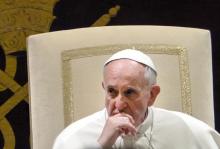
Pope Francis is tipped to win this year’s Nobel Peace Prize, according to some of the world’s leading bookmakers.
The Argentinian pope is currently the 5-2 favorite to win the award, which will be announced by the Nobel Institute in Oslo, Norway, on Oct. 10, according to British bookmaker William Hill. Irish bookmaker Paddy Power also considers him a leading contender.
The pontiff’s odds have fallen from 11-4 in a sign of his worldwide popularity.
“When the odds get shorter, that’s when you sit up and pay attention,” said Jon Ivan-Duke, spokesman for William Hill. “Maybe there’s some divine inspiration at work.”
Nevertheless, Francis is facing stiff competition from National Security Agency whistleblower Edward Snowden and U.N. Secretary-General Ban Ki-Moon.
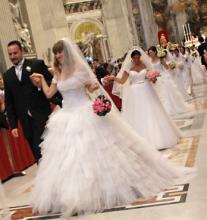
Pope Francis and his bishops got a wake-up call Oct. 7 from a Wisconsin couple who said the Catholic Church was failing to deal with the collapse of the traditional family.
Jeff and Alice Heinzen of La Crosse told the pope and 180 bishops attending a synod devoted to family issues that they were alarmed by the number of young people born out of wedlock or living with divorced parents.
The couple are one of 14 married couples invited to give their testimony.
“We have seen the number of marriages decline each year and the rate of cohabitation increase,” said the Heinzens, who have been married 34 years. “We know countless divorced adults who have joined other faith communities because they do not feel welcomed in the Catholic Church.”
What’s more, the couple added, the church’s pastoral programs were failing to address the forces impacting marriage and family life.
I GREW UP IN RURAL IRELAND in the 1950s in a world surrounded by trees.
Close to my home, a ribbon of horse chestnuts lined both sides of the road. Each summer their intertwining canopies shut out the light, which gave the road its name—the dark road. In the fields around our house there were stands of oak, birch, elm, and sycamore. About 40 yards to the south and west, my father planted a shelter belt of Leylandii. We had different varieties of apple trees in the orchard, and two pear trees.
In 1962, just as the Second Vatican Council was beginning, I entered St. Columban’s seminary to be a priest. The seminary was located on a large estate called Dowdstown in County Meath. More than 150 acres were covered in woodlands full of indigenous trees such as oak, hazel, holly, ash, Scotch pine, willow, elm, and rowan. There were also exotic species, including a number of the sturdy cedars of Lebanon, a variety of cherry trees, and even a few California redwoods. The folklore in the area was that the trees had been planted in the 1820s by Gen. Robert Taylor, who had fought alongside Wellington at the Battle of Waterloo.
Trees are the dominant life form on land—and the longest-lived creatures on earth. During my seven years in seminary, while studying philosophy, theology, spirituality, and scripture, we never once looked to the natural world or trees for insight into our relationship with God, other human beings, or other species. And there is so much to learn! Sadly, theology and scripture presentations were isolated almost exclusively to the divine-human relationship, with little consideration given to the rest of creation.
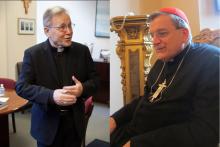
Leading up to a Vatican summit on family life that Pope Francis opens on Oct. 5, high-ranking churchmen have fiercely debated church teaching — and criticized each other — in sharp exchanges that offer a ringside seat to the kind of battles that Rome used to keep under wraps.
But amid all this verbal sparring, the opposing camps have found one point of consensus: Airing their differences is good for the Roman Catholic Church.
“Everybody is free to express his opinion. That is not a problem for me,” Cardinal Walter Kasper, a German theologian who has emerged as the point man for the reformists, said in an interview published Sept. 29 in America magazine.
“The pope wanted an open debate, and I think that is something new because up to now often there was not such an open debate. I think that’s healthy and it helps the church very much.”
A day later, Cardinal Raymond Burke, an American who heads the Vatican’s highest court and a vocal exponent of the conservative camp opposing Kasper, spoke to reporters to toss back a few barbs. But he, too, praised the frankness of the exchanges.
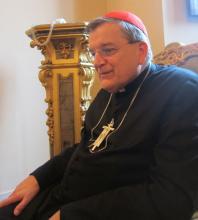
Public disagreements over whether the Roman Catholic Church can change its teachings on Communion for remarried Catholics are growing sharper on the eve of a major Vatican summit, with conservatives led by U.S. Cardinal Raymond Burke making another push against loosening the rules.
In a conference call with reporters on Sept. 30, Burke, who currently heads the Vatican’s high court, singled out the leading proponent of reforms, German Cardinal Walter Kasper, and his claims that critics of his proposals are really attacking Pope Francis.
Kasper has said that the pope supports his efforts to find ways to fully reintegrate divorced and remarried Catholics into church life. The proposals have become a prime focus of the upcoming Vatican meeting, called a synod, which will convene on Oct. 5 for two weeks to consider changes in family life in the modern world.
“I find it amazing that the cardinal claims to speak for the pope,” said Burke, the former archbishop of St. Louis, speaking from Rome. “The pope doesn’t have laryngitis. The pope is not mute. He can speak for himself. If this is what he wants, he will say so.”
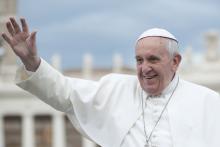
Religious leaders agree the Islamic State — also known as ISIL or ISIS — must be stopped. Their struggle is how best to do it.
“As mainstream religious leaders of different faiths get together, it strengthens the voice of moderation,” said Ibrahim Hooper of the Council on American-Islamic Relations, the nation’s largest Muslim advocacy group.
A group of mainstream Muslim scholars sought to strip the Iraqi and Syrian militants of any legitimacy under the cover of Islam in an open letter in Arabic issued Sept. 24.
U.S. Christian leaders have also spoken out and say they hope to dissuade youth from joining the Islamic State ranks by developing an alternative world view that counters the group’s religious claims.
“To offer a different world view endorsed by religions, as well as governments, in the long term will go a long way to defeating its appeal to those who are looking to join them,” said Antonios S. Kireopoulos of the National Council of Churches. The council represents about 45 million Christians, from mainstream Protestants to “living peace” congregants.
Recent comments by Pope Francis about the conflict rocking the Middle East have left some religious leaders mixed about his intent.

Pope Francis had ordered the arrest of a former Polish archbishop accused of child sex abuse in the Dominican Republic because the case was “so serious,” the Vatican said Sept. 23.
Jozef Wesolowski, who was defrocked by a Vatican tribunal earlier this year, is under house arrest inside Vatican City due to the “express desire” of Pope Francis, the Vatican said in a statement.
“The seriousness of the allegations has prompted the official investigation to impose a restrictive measure that … consists of house arrest, with its related limitations, in a location within the Vatican City State,” the Vatican’s chief spokesman, the Rev. Federico Lombardi, said.
Wesolowski was removed from his position in the Dominican Republic and recalled to the Vatican in August 2013 amid claims that he had abused boys in Santo Domingo.
The former archbishop is awaiting trial on criminal charges at the Vatican and could eventually face charges in the Dominican Republic and in his native Poland.

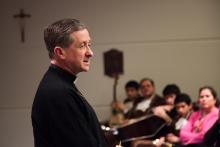
When Spokane Bishop Blase Cupich got a call 10 days ago with the news that Pope Francis had chosen him to be the next archbishop of Chicago — the pontiff’s most important U.S. appointment to date — he was so taken aback that he couldn’t speak for a few moments.
“To say that I was surprised doesn’t come close to the word I would use,” Cupich said Sept. 20 at a news conference in Chicago introducing him as the successor to Cardinal Francis George, who is 77 and battling cancer.
Asked by reporters how long it took for the reality of his appointment to sink in, Cupich smiled and said, “It’s still sinking in.”
A lot of other Catholics are trying to absorb the news as well, just as surprised that Francis picked the 65-year-old Cupich, who had been considered a long shot by many Vatican handicappers. They were also pleased, or concerned, that the pope had evidently chosen a bishop who shared his own emphasis on listening to the flock and caring for the poor.
“I think that he” — Francis — “sent a pastor, not a message,” Cupich told reporters.
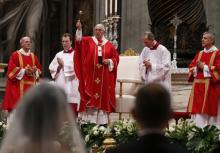
Pope Francis made headlines this week when he officiated at the weddings of 20 couples, including some who had been living together and a woman who has a daughter from a previous relationship.
It was the first time that the Argentine pontiff had presided over a marriage ceremony since his election and it may have also signaled a dramatic shift in Catholic Church doctrine.
Now five conservative cardinals appear to be hitting back.
In a new book to be released days before the world’s Catholic bishops gather at the Vatican for their October Synod, the hard-liners are challenging moves to moderate church doctrine on marriage and offer Communion to divorced Catholics who remarry.
The book, Remaining in the Truth of Christ: Marriage and Communion in the Catholic Church, will be published in five languages, including English and Italian, on Oct. 1.
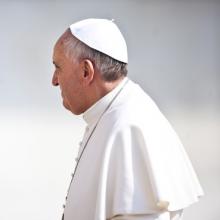
Pope Francis faces no specific threat from Islamic State militants and will not be adding extra security measures on his one-day trip to Albania next week, the Vatican said Sept 15.
The Vatican’s chief spokesman, the Rev. Federico Lombardi, said despite recent “worrying” events that had shocked the world, there was no specific threat to the 77-year-old pontiff as he prepared for his official visit to the majority Muslim country on Sept. 21.
Lombardi said Francis would use the same open-topped vehicle he uses to greet crowds in St. Peter’s Square when he travels to the Albanian capital, Tirana.
“There is no reason to change the pope’s itinerary,” Lombardi said. “We are obviously paying attention but there is no need for concern or a change to his program in Albania.”
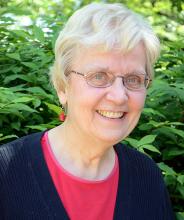
In November, Sister Maureen Fiedler hand-delivered a letter to Pope Francis’ ambassador in Washington, D.C., urging the pontiff to renounce a series of 15th-century church documents that justify the colonization and oppression of indigenous peoples.
She doesn’t know if the letter made it to the Vatican. But she’s hopeful a recent resolution by the Leadership Conference of Women Religious will spur the pope to repudiate the centuries-old concept known as the “Doctrine of Discovery.”
“When I learned about it, I was horrified,” said Fiedler. As a member of the Loretto Community, a congregation of religious women and lay people, Fiedler first heard of the doctrine when her order marked its 200th anniversary by challenging “the papal sanctioning of Christian enslavement and power over non-Christians.”

Pope Francis wrote to the president of Iraq, calling for an end to the “brutal suffering of Christians and other religious minorities” and urging political leaders to end the humanitarian crisis in the country.
Francis said in his letter to Iraqi President Fouad Massoum:
“I appeal to you with my heart full of pain while I follow the brutal suffering of Christians and other religious minorities who are forced to leave their homes, as their places of worship are destroyed.”
Cardinal Fernando Filoni, the pope’s official envoy to Iraq, delivered the pope’s message during his recent trip to that country. The two met at the Vatican on Thursday. The pope previously appealed to U.N. Secretary-General Ban Ki-moon to intervene to end the crisis.
Earlier this week, Francis revealed during a media conference with reporters that he was ready to travel to Iraq to try to find a solution to the ongoing violence.

Addressing journalists on his return from his intense five-day visit to South Korea late August 18, Pope Francis bantered with reporters and lightheartedly said he may only have “two or three” years left to live.
The 77-year-old pontiff covered a range of topics on the flight back to the Vatican—from war-torn Iraq and his desire to visit the U.S. next year to his personal health, hinting he may retire early.
He was asked how he lived with the immense popularity he has generated around the world, evident when crowds chanted his name on the streets of Rio de Janeiro during his first official visit to Brazil last year.
“I try to think of my sins, my mistakes, so as not to think that I am somebody,” he said. “Because I know this will last a short time, two or three years, and then (go) to the house of the Father,” he said during an in-flight media conference.
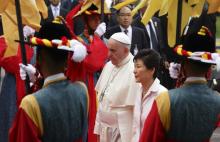
At Beijing’s oldest Roman Catholic Church on Wednesday, Mary Zhang, 54, eagerly awaited the arrival of Pope Francis—at cruising altitude.
“I’m very excited. It’s the first time the pope has flown over China,” said Zhang, a regular worshipper at the Cathedral of the Immaculate Conception who volunteered to help clean the church.
“I really hope he can give a Mass in person in China one day. It’s a sign of a better relationship between the Vatican and Beijing, as flying over China was not allowed before.”
The pontiff, who landed in Seoul on Thursday for a five-day visit to South Korea, sent a telegram of greetings to Chinese President Xi Jinping as the papal plane flew over northeastern China, as Francis does with any country he flies over, in accordance with Vatican protocol.
The telegram, sent early Thursday, read, “Upon entering Chinese airspace, I extend best wishes to your excellency and your fellow citizens, and I invoke the divine blessings of peace and well-being upon the nation,” The Associated Press reported.
Popes have globe-trotted for decades, but none has visited China, a communist nation that crushed religion during Chairman Mao Zedong’s time. Today, China is more open but remains a “Country of Particular Concern,” according to the U.S. State Department’s latest International Religious Freedom Report, which last month described the continued harassment and detention of some Catholic clergy in China.
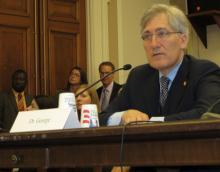
A coalition of more than 50 religious leaders, led by mostly conservative Catholic, evangelical, and Jewish activists, is calling on President Obama to sharply escalate military action against Islamic extremists in Iraq. They say “nothing short of the destruction” of the Islamic State can protect Christians and religious minorities now being subjected to “a campaign of genocide.”
“We represent various religious traditions and shades of belief,” the petition reads. “None of us glorifies war or underestimates the risks entailed by the use of military force.”
But they say the situation is so dire that relief for these religious communities “cannot be achieved apart from the use of military force to degrade and disable” the Islamic State forces.
The petition was organized by Robert P. George, a prominent Catholic conservative and Republican activist, and he was joined by a range of other leaders, many of whom are known for their hawkish views on foreign policy.